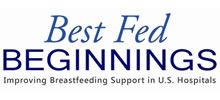
Best Fed Beginnings seeks to reverse these trends by dramatically increasing the number of U.S. hospitals implementing a proven model for maternity services that better supports a new mother’s choice to breastfeed.
Emory University Hospital Midtown (EUHM) has been selected as one of 90 hospitals across the U.S., and one of seven in Georgia, to participate in a new national effort to improve breastfeeding rates in states where rates are currently the lowest. Although breastfeeding is one of the most effective preventive health measures for infants and mothers, half of the babies born in the U.S. are given formula within the first week of life. By nine months of age, only 31 percent of babies are breastfeeding at all.
The announcement comes as more than 170 countries around the globe celebrate World Breastfeeding Week from Aug. 1-7. The week is designed to encourage breastfeeding and improve the health of babies around the world.
The new, 22-month initiative, called Best Fed Beginnings, seeks to reverse these trends by dramatically increasing the number of U.S. hospitals implementing a proven model for maternity services that better supports a new mother's choice to breastfeed.
"We recognize that for women who plan to breastfeed, the hospital experience strongly influences a mother's ability to start and continue breastfeeding," says Ruth Simmons, coordinator of EUHM's Lactation Support Services. "This new program shows our commitment to support mothers' wishes after delivery." Simmons is leading the Best Fed Beginnings program at the midtown hospital.
Led by the National Initiative for Children's Healthcare Quality and the Centers for Disease Control and Prevention, and working closely with Baby-Friendly USA, Inc., the program guides hospitals in pursuit of what's referred to as "Baby-Friendly" designation. The designation verifies that a hospital has comprehensively implemented the American Academy of Pediatrics-endorsed Ten Steps to Successful Breastfeeding, as established in the WHO/UNICEF Baby-Friendly Hospital Initiative.
Breastfeeding rates are higher and disparities in these rates are virtually eliminated in hospitals that achieve Baby-Friendly status.
"Our goal is to make system-level changes to our maternity care practices, which will guide us to reaching Baby-Friendly designation," says Evelyn Jirasakhiran, nursing director for Women's Health Services at EUHM. "We are excited about the process, which will greatly benefit our mothers and their newborns in the short- and long-term."
Breastfeeding has multiple health benefits for both infants and mothers. For infants, it decreases the severity of illnesses, optimally supports neurodevelopment and reduces the risk of becoming obese later in childhood. For mothers, breastfeeding decreases the risks of breast and ovarian cancers, diabetes and cardiovascular disease.
